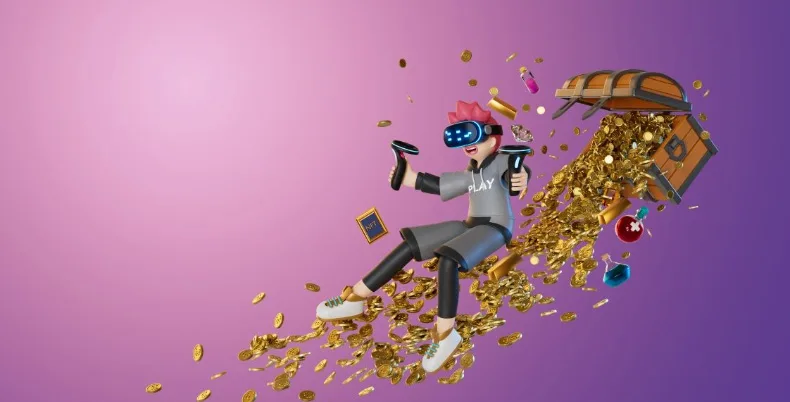Today’s contributing author discusses the intersection of gaming, the metaverse, and crypto, then offers hands-on experience. They’ll offer insights on which companies show the most promise when it comes to metaverse development.
If you’re an avid gamer, explore the world of crypto game development. Combining the thrill of gaming with the potential for financial gains, crypto games have taken over the gaming industry. We will delve into crypto game development, its benefits, and how it can enhance your gaming experience.
Introduction to Crypto Game Development
Crypto game development involves creating and deploying video games incorporating blockchain technology and cryptocurrencies. Unlike traditional games, crypto games allow players to earn, trade, and own in-game assets with real-world value. These assets are often represented as non-fungible tokens (NFTs), unique digital assets recorded on a blockchain.
Understanding Blockchain Technology
Blockchain technology is the underlying foundation of crypto games. It is a decentralized and transparent ledger that securely records transactions and maintains a permanent ownership history. Using blockchain technology, crypto games give players true ownership and control over their in-game assets, eliminating the possibility of fraud or manipulation.
The Intersection of Gaming and Cryptocurrency
The convergence of gaming and cryptocurrency has opened up new opportunities for gamers. Crypto games introduce economic elements to the gaming ecosystem, allowing players to trade virtual assets, participate in decentralized finance (DeFi) mechanisms, and earn cryptocurrencies. This fusion of gaming and finance creates an immersive and dynamic gaming experience.
Benefits of Crypto Game Development
Ownership and Control: In crypto games, players have complete ownership and control over their in-game assets. They can buy, sell, and trade these assets as they please, without any restrictions imposed by game developers.
Earning Potential: Crypto games allow players to earn cryptocurrencies by playing the game and engaging in various activities within the game world. This opens up a new avenue for gamers to monetize their playing skills and time.
Player-driven Economies: Crypto games often feature player-driven economies where the value of in-game assets is determined by supply and demand. This creates a dynamic ecosystem where players can speculate, invest, and strategize to maximize their profits.
Interoperability: Blockchain technology enables interoperability between different games and platforms. Players can transfer their assets seamlessly across various games, fostering a vibrant and interconnected gaming ecosystem.
Popular Crypto Games in the Market
CryptoKitties: One of the earliest and most popular crypto games, CryptoKitties allows players to breed, collect, and trade virtual cats. Each CryptoKitty is represented as an NFT, making it a unique and valuable digital asset.
Axie Infinity: Axie Infinity is a blockchain-based game where players can collect, breed, and battle adorable creatures called Axies. Players can earn cryptocurrency rewards by participating in battles and tournaments.
Decentraland: Decentraland is a virtual reality platform powered by blockchain technology. It allows users to create, explore, and monetize virtual worlds. Players can buy and sell virtual land and create unique experiences for others.
NFTs: The Game-Changer in Crypto Games
Non-fungible tokens (NFTs) have revolutionized the world of crypto games. These unique digital assets can represent anything from in-game items to virtual real estate. NFTs provide verifiable ownership and scarcity, allowing players to own and trade valuable assets within the game ecosystem.
Creating Your Own Crypto Game
Interested in developing your own crypto game? Here are a few steps to get you started:
Define your game concept: Determine your crypto game’s mechanics, art style, and overall theme.
Choose a blockchain platform that supports smart contracts and NFTs, such as Ethereum or Binance Smart Chain.
Develop smart contracts: Create smart contracts to govern the in-game economy, asset ownership, and transaction mechanisms.
Design and develop the game: Bring your game concept to life by designing and developing the gameplay, user interface, and interactive elements.
Integrate with wallets and marketplaces: Enable players to connect their wallets, trade assets, and participate in the broader crypto gaming ecosystem.
Also Read: How Important is Community Engagement in Crypto Game Development?
Monetization Strategies in Crypto Games
Crypto games offer various monetization strategies for game developers, including:
Asset Sales: Sell limited edition or exclusive in-game assets directly to players.
Transaction Fees: Implement transaction fees for in-game trades and transactions.
Play-to-Earn: Enable players to earn cryptocurrencies by completing in-game tasks and challenges.
Partnerships and Sponsorships: Collaborate with brands and sponsors to promote their products within the game world.
Security Considerations in Crypto Game Development
When developing crypto games, security is of utmost importance. Here are some key considerations:
Smart Contract Audits: Conduct thorough audits of your smart contracts to identify and mitigate potential vulnerabilities.
Secure Asset Storage: Implement robust security measures to protect players’ assets and private keys.
Regular Updates and Patches: Stay proactive in addressing security vulnerabilities by releasing regular updates and patches.
The Future of Crypto Game Development
The future of crypto game development looks promising. As blockchain technology continues to evolve and gain mainstream adoption, we can expect more innovative and immersive gaming experiences. With the integration of virtual reality, augmented reality, and decentralized technologies, the boundaries of gaming will be pushed even further.
Conclusion
Crypto game development has ushered in a new era of gaming, offering players unique opportunities to earn, trade, and own in-game assets. By leveraging blockchain technology, these games provide true ownership and control to players, creating dynamic and player-driven economies. As the industry continues to grow, the future of crypto game development holds exciting possibilities for gamers worldwide.









Recent Comments